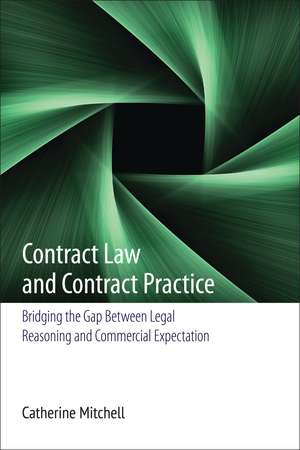Contract Law and Contract Practice: Bridging the Gap Between Legal Reasoning and Commercial Expectation
Autor Catherine E Mitchellen Limba Engleză Hardback – dec 2013
Preț: 541.71 lei
Preț vechi: 774.82 lei
-30% Nou
Puncte Express: 813
Preț estimativ în valută:
103.66€ • 112.95$ • 87.35£
103.66€ • 112.95$ • 87.35£
Carte disponibilă
Livrare economică 02-16 aprilie
Preluare comenzi: 021 569.72.76
Specificații
ISBN-13: 9781849461214
ISBN-10: 184946121X
Pagini: 312
Dimensiuni: 156 x 234 x 15 mm
Greutate: 0.62 kg
Ediția:New.
Editura: Bloomsbury Publishing
Colecția Hart Publishing
Locul publicării:London, United Kingdom
ISBN-10: 184946121X
Pagini: 312
Dimensiuni: 156 x 234 x 15 mm
Greutate: 0.62 kg
Ediția:New.
Editura: Bloomsbury Publishing
Colecția Hart Publishing
Locul publicării:London, United Kingdom
Caracteristici
This book explores the common assertion within contract law scholarship and cases that a good contract law (or a good commercial contract law) will meet the needs and expectations of commercial contractors.The book seeks to move contract law beyond a simple dichotomy between contextualist and formalist legal reasoning, to a more nuanced and responsive legal approach to the regulation of commercial agreements.An interesting and fresh analysis that will be of interest to all those concerned with contract law.
Notă biografică
Catherine Mitchell is a Reader in Law at the University of Hull.
Cuprins
1. Introduction: The Relationship between Contract Law and Commercial Expectations Contexts and Background The Deficiencies of Classical Contract Law The Wider Debate: A Contextual and Relational Approach to Contracts Specific Lines of Enquiry Defining and Identifying 'Commercial Expectations' Descriptive Accuracy of the Mismatch Claim Theoretical Difficulties Posed by the Commercial Expectations Argument (i) Efficiency and Rights-based Theories (ii) Relational Contract Theory The Capacity of Contract Law (i) The Character and Limits of Legal Regulation (ii) The Limits of the Socio-legal and Empirical Scholarship Commercial Agreements, Contracts and Contract Law 2. Understanding Commercial Expectations What Does an Appeal to Commercial Expectations Mean? Why do Commercial Expectations Matter? A More Accurate Picture of the Parties' Agreement Accordance with the Self-understandings of Participants in the Practice The Role of Co-operation in Business Dealings The Perceived Values of Commercial Law Normative Derivation of Commercial Expectations Changes in Contracting Practice The Influence of Transaction Cost Economics Networks Umbrella Agreements Conclusion 3. The Contours and Sources of Commercial Expectations Empirical Studies of Commercial Contracting Behaviour PreliminariesThe Use of Legally Enforceable Contracts The Use of Private Legal Systems Norms of the Business Relationship Do Customs Exist? Legalisation of Immanent Business Norms Costs of Enforcement The Role of Trust in the Business Relationship Conclusion 4. Current Contract Law and Commercial Expectations Tensions between Law and Commercial Contracting Behaviour The Significance of the Documents (i) Differing Frameworks for an Agreement (ii) Absence of Formalities Contract Interpretation and Commercial Reasonableness Contracts and their Contents The Battle of the Forms Contracting for Flexible Commitments Conclusion 5. Commercial Expectations and Theories of Contract Law Distinguishing Rights-based and EfficiencyAccounts of Promising Promissory Theories Main Features Promissory Theories and Commercial Expectations Economic Analysis of Contract Main Features Economic Analysis and Commercial Expectations Characteristics of the Contracting Parties The Efficiency of Social Norms Contract Modification Contract Interpretation A Variable Approach? Conclusion 6. The Relational Theory of Contract Characteristics of Relational Analysis of Contracts Essential Contract Method: Macneil's Common Contract Norms Significance for the Law of Contract Relational Legal Reasoning: Initial Difficulties Neoformalism Relational Legal Reasoning: Possible Processes Conclusion 7. Commercial Expectations and Legal CapacityRelationalism, Contract Law Rules and Common Law Method Relationalism, Judicial Legitimacy and Judicial Activism Objectivity Legal Commitment to the Written Agreement The Litigation Process Litigating Parties Contract Law as a Product Litigation as a Self-contained Context Transformation and Legalisation of Norms Judicial Expertise and Error Path Dependency and the Characteristics of Legal Regulation Conclusion 8. Conclusion: Aligning Contract Law and Commercial Expectations The Binary Divide of Formalism and Contextualism Methods of Effecting a Relationally Constituted Contract Law Contextual Interpretation Case Examples (i) Conflict between Formal and Informal Norms: RTS Flexible Systems Ltd v Molkerei Alois Müller GmbH & Co KG (UK Productions) (ii) Interpreting the Agreement as a Unified Scheme: Total Gas Marketing v Arco British (iii) Avoiding a Doctrine-driven Approach: Durham Tees Valley Airport Ltd v BMIBaby Ltd Changing Mindset Contracting In or Contracting Out of Contextualism? Conclusion
Recenzii
Mitchell's book is a very valuable contribution to our understanding of and thinking about relational contract theory...Her book deserves to be read by every serious student of contract law.
This is a stimulating and highly insightful work, meticulously researched, carefully argued, and both cognisant of and scrupulously fair to counter-argument. It is an important contribution to contract scholarship and deserves to be widely read.
Ms. Mitchell's scholarship is impressive and the range of material that she has covered means that she has developed a powerful tool for examining the question she has set out to answer.
This is a stimulating and highly insightful work, meticulously researched, carefully argued, and both cognisant of and scrupulously fair to counter-argument. It is an important contribution to contract scholarship and deserves to be widely read.
Ms. Mitchell's scholarship is impressive and the range of material that she has covered means that she has developed a powerful tool for examining the question she has set out to answer.
Descriere
Departing from the literature on contract law and commercial expectations, this book moves contract law beyond a simple dichotomy between contextualist and formalist legal reasoning, to a responsive approach to the regulation of commercial agreements.
